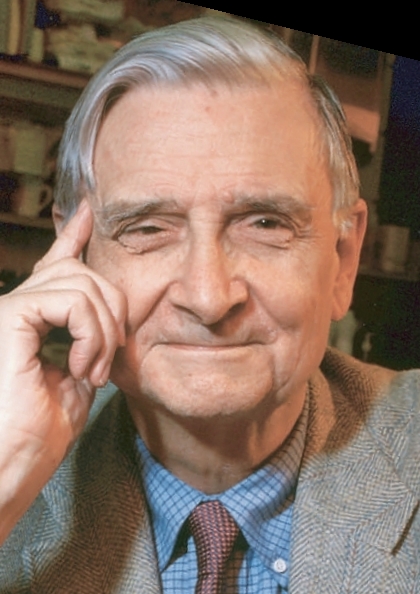Frases célebres de Edward Osborne Wilson
Fuente: Edward O. Wilson: The Diversity of Life (1999), 259
Fuente: Edward O. Wilson: Dilemma'. On Human Nature (1978, 1979), 2.
“Este planeta puede ser un paraíso en el siglo XXII.”
Fuente: Declaración cuando le concedieron el "TED Prize" http://ted.com/tedprize/winners2007.cfm, que ganó en 2007.
Fuente: Consilience: The Unity of Knowledge (1998, 1999), 286. Citado en: Citas de Edward O. Wilson (en inglés) http://www.todayinsci.com/W/Wilson_Edward/WilsonEdward-Quotations.htm. Today in Science History.
Edward Osborne Wilson Frases y Citas
Fuente: Citado en: R.Z. Sheppard, Nature: Splendor in The Grass, Time (3 de septiembre de 1990).
“Teoría maravillosa, especie equivocada.”
Sobre el marxismo, que consideraba más adecuado para las hormigas que para los humanos.
Fuente: http://arts.independent.co.uk/books/news/article2886394.ece
Fuente: Citado en: Jamie Murphy y Andrea Dorfman, The Quiet Apocalypse, Time (13 de octubre de 1986).
Fuente: Can biology do better than faith? http://www.newscientist.com/article/dn8254-can-biology-do-better-than-faith.html. NewScientist.com, 02 de noviembre de 2005. Consultado el 26-10-2010.
Edward Osborne Wilson: Frases en inglés
Gaia Atlas of Planet Management
Fuente: Consilience: The Unity of Knowledge (1998), p. 262.
“The evolutionary epic is probably the best myth we will ever have.”
On Human Nature (1978)
“The borderline between normal and schizophrenic people is broad and nearly imperceptible.”
On Human Nature (1978), Ch.3 Development
“The emergence of civilization has everywhere followed a definable sequence.”
On Human Nature (1978), Ch.4 Emergence
Fuente: Letters to a Young Scientist (2013), chapter 16, "Searching for New Worlds on Earth", page 177.
“To know how scientists engage in visual imagery is to understand how they think creatively.”
Fuente: Letters to a Young Scientist (2013), chapter 5, "The Creative Process", page 69.
The Diversity of Life
“This planet can be a paradise in the 22nd century.”
Statement quoted at the "TED Prize" website, which he won in 2007 http://ted.com/tedprize/winners2007.cfm
Talk at the 50th anniversary of New Scientist magazine (2006).
Fuente: Consilience: The Unity of Knowledge (1998), p. 264.
Biophilia (1984)
“The incest taboo is another major category of primed learning.”
On Human Nature (1978), Ch.3 Development
Fuente: Consilience: The Unity of Knowledge (1998), p. 245.
